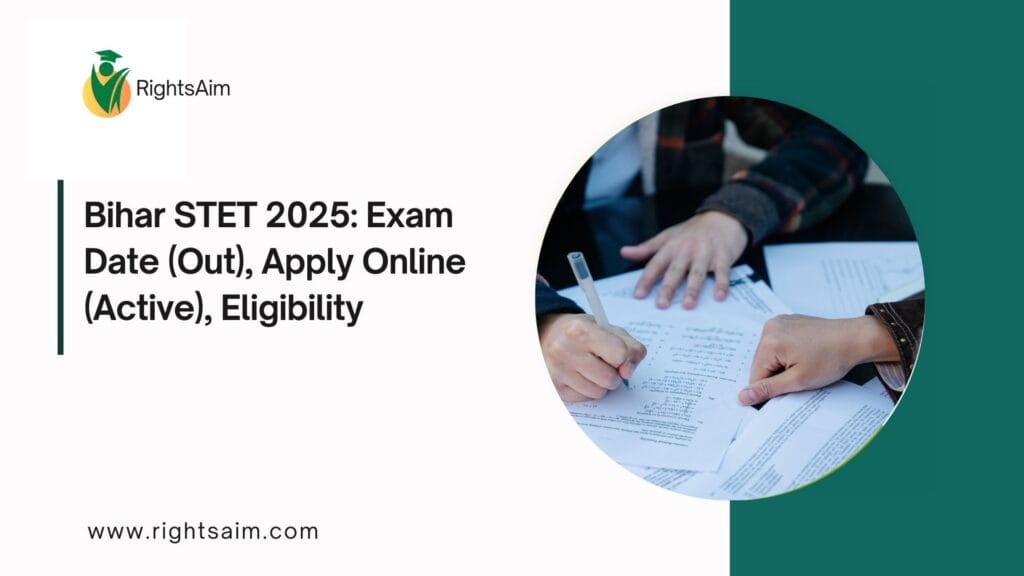
 Exam Dates & Important Timeline
Exam Dates & Important Timeline
The official notification for Bihar STET 2025 was released on 10 September 2025.
The application window is active from 19 September to 27 September 2025
The exam is scheduled to be held between 4 October and 25 October 2025
Detailed shift timings and exam centre details will be shared later by BSEB.
So, you have from mid-September to late October as key windows for registration and exam performance.
 Apply Online: How to Register
Apply Online: How to Register
Here’s how to apply for Bihar STET 2025:
Visit the official portal
The application is handled via Bihar School Examination Board’s portal:secondary.biharboardonline.comor the STET-specific portal.Fill the application form
Enter all personal, academic, contact info, choose the Paper (I or II or both) etc.Upload documents
Upload scanned photograph, signature, educational certificates, ID proofs in prescribed formats.Pay the fee
For General / OBC / EWS: ₹960 for Paper I, ₹1440 for Paper II
For SC / ST / PwD: ₹760 for Paper I, ₹1140 for Paper II
Submit & print acknowledgment
After submission, keep a copy of the confirmation / acknowledgment slip for future reference.
Make sure to apply before 27 September 2025 — the link will be disabled after that.
 Eligibility Criteria
Eligibility Criteria
To be eligible for Bihar STET 2025, candidates must satisfy certain educational and other criteria. Based on media reports:
For Paper I (Secondary, i.e., teaching Classes 9 & 10)
Bachelor’s degree in the relevant subject / discipline with at least 50% marks, plus B.Ed. or its equivalent, or
A 4-year integrated B.Ed. course as per NCTE norms
For Paper II (Senior Secondary, i.e., teaching Classes 11 & 12)
Master’s degree in the subject plus B.Ed. or equivalent qualification in education, or
Other qualifications as per NCTE / state norms
Other conditions (often included)
Candidate should be an Indian citizen & likely a resident of Bihar (if specified in notification)
Fulfilling age limits / relaxations (if any) as per state rules
Educational qualification completion by a specific date (i.e., must have passed before applying)
Always check the official notification PDF for exact eligibility requirements, as minor modifications are possible.
 Exam Pattern & Syllabus Overview
Exam Pattern & Syllabus Overview
Exam Pattern
Mode: Online / CBT (Multiple choice questions)
Papers: Paper I (for 9-10) and Paper II (for 11-12)
Number of questions: 150 questions in each paper
Total marks: 150 marks (each question carries 1 mark)
Negative marking: No negative marking (i.e. incorrect answers get 0)
Duration: Possibly around 150 minutes (i.e. 2.5 hours) per paper (as inferred from standard STET practices)
Because both papers follow this format, candidates should plan time management accordingly.
Syllabus Highlights
Both papers share a common structure: content knowledge + pedagogy / teacher aptitude parts. Major subject areas include:
For Paper I (Classes 9–10)
Languages: Hindi, English, Urdu, Bangla, Maithili, Sanskrit etc.
Subject knowledge: Mathematics, Science, Social Science (History, Geography, Civics)
Teaching aptitude / pedagogy / methods / educational psychology / classroom practices etc.
For Paper II (Classes 11–12)
Advanced subject knowledge in chosen discipline (e.g. Physics, Chemistry, Biology, Commerce, Economics, Geography, Languages etc.)]]
Educational / teaching pedagogy, methodology, evaluation, learning theories etc.
Each subject in the main content part will have questions from graduation / postgraduate / state syllabus levels.
You can download official syllabus PDFs and subject-wise breakdowns (many sites offer them) for detailed topics.
 Key Tips & Strategy for Aspirants
Key Tips & Strategy for Aspirants
Start with teaching aptitude / pedagogy — since it is common to both papers and many candidates neglect it.
Ensure your subject knowledge is strong in the discipline you choose — focus on graduation / state syllabus depth.
Since there is no negative marking, attempt all questions (if you’re confident) rather than leaving blanks.
Practice mock tests for time management under the 150-minute constraint.
Revision: maintain short notes, especially for pedagogical theories, educational psychology, methods of teaching etc.
Keep an eye on official updates, exam shifts, hall tickets, and syllabus changes.

 Exam Dates & Important Timeline
Exam Dates & Important Timeline Apply Online: How to Register
Apply Online: How to Register Eligibility Criteria
Eligibility Criteria Exam Pattern & Syllabus Overview
Exam Pattern & Syllabus Overview Key Tips & Strategy for Aspirants
Key Tips & Strategy for Aspirants
